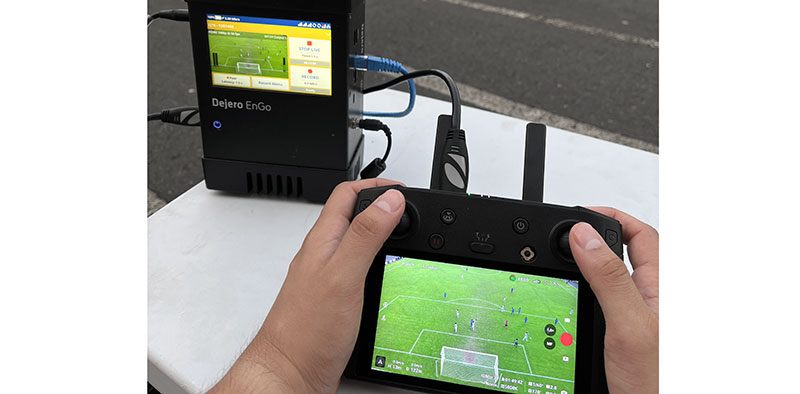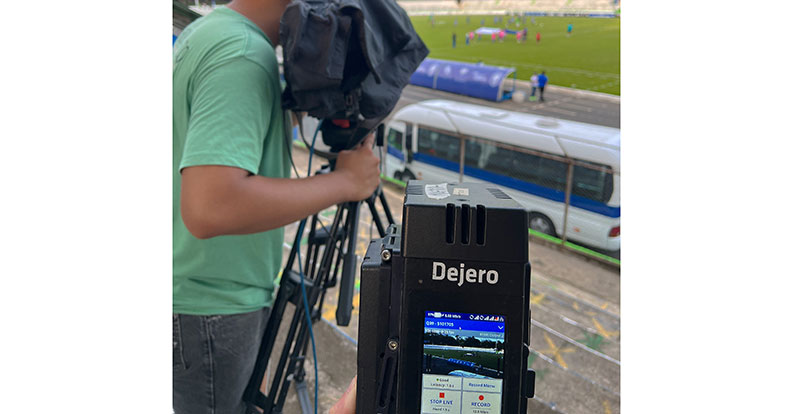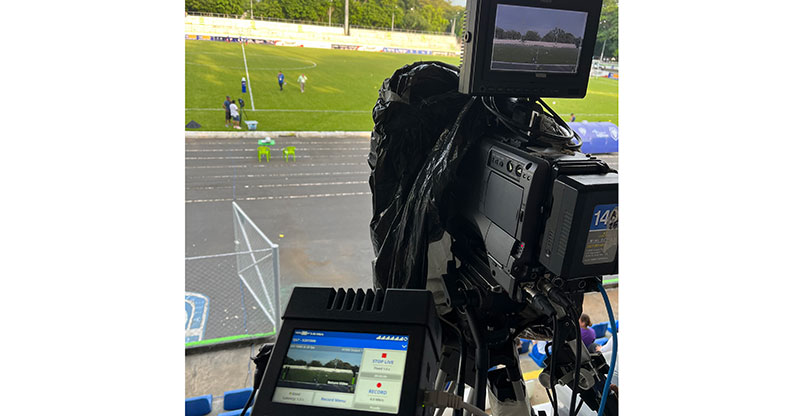A customised remote production workflow is in use for live broadcast of El Salvador’s soccer league using EnGo mobile transmitters and other Dejero gear for continuous connectivity.

Spanish production company Quality has developed a bespoke remote production workflow for the live broadcast of El Salvador’s national soccer league, Liga Nacional de Fútbol de El Salvador. Delivered via Latin American sports subscription television channel Tigo Sports, efficiency was a key factor, as eight soccer matches per week had to air.
Aware that, under a traditional workflow, an outside broadcast truck and nearly the entire Quality production crew would need to physically tour stadiums across El Salvador for ten months of the year to cover the matches, the company took a different approach.
Dejero EnGo mobile transmitters, WayPoint receivers and CuePoint return servers are now supporting Quality’s remote multi-camera productions. Using these devices, the team can maintain uninterrupted connectivity between the stadiums and their Buenos Aires production hub. Tigo Sports awarded Quality a three-year production contract for the work.
“By using Dejero hardware at all the soccer stadiums across El Salvador as well as our Buenos Aires hub, we have set up a remote production workflow that saves significant time, resources and money,” said Pablo Reyes, chief production officer and partner at Quality. “All of the production facilities and resources remain in Quality’s Buenos Aires hub. We have been saving 65% to 70% on setup time and costs, including cable installation, production crew time, travel and other expenses, as well as overall logistics.”

Ten EnGo mobile transmitters, which operate at sub-second glass-to-glass latency, are in use. Seven of them are transporting primary and secondary feeds from seven cameras covering the match action. Two more transmitters are used for dedicated cameras recording pre- and post- match interviews, plus another for a camera feed from a drone for aerial shots in any given stadium.
Using this new remote production model, Quality only sends the camera operators and talent with the EnGo transmitters to the stadiums. Because the devices are easy to operate and don’t require a complex setup, the crew and cameras are ready to go live within a few minutes. Due to the reliability of their connectivity from varied locations, the producers, directors, graphics operators and technicians can remain in Buenos Aires, where they package content for distribution from the hub.
The EnGo devices are all built with Dejero’s Smart Blending Technology, which aggregates multiple IP connections, including wired broadband and fibre networks with wireless 3G/4G/5G, Wi-Fi and satellite networks. For Nacional de Fútbol de El Salvador, Quality is using six local SIM cards from multiple network carriers in each EnGo. The result is high-speed, reliable, uninterrupted connectivity while transmitting broadcast-quality live video and reducing the cost of production logistics. The EnGo also has a rugged design that is robust enough to handle El Salvador’s heavy tropical rainfall.

Six Waypoint receivers, located at the Buenos Aires hub, reconstruct and decode the video feeds from Dejero transmitters. The decoded video enters a matrix to be shared with the switcher and replay systems. The packaged content is then uplinked via satellite for distribution across the Tigo Sports network.
A microphone at the hub is also connected by an XLR audio cable to a WayPoint receiver, so the director can communicate with camera operators using the EnGo IFB voice communication feature. A CuePoint return video server sends back low-latency, live program video to camera operators at the stadium to help keep them synchronized with central production during the live broadcasts.
As well as Tigo Sports and the Salvadorean soccer league, Quality uses Dejero connectivity devices to support remote productions for over 50 broadcasters and sports federation customers worldwide, which includes International Federations such as FIFA, FIBA, FINA, IWF, Rugby Europe and various world sports committees, plus many private sports promoters such as Grises Humacao and Peter Auto, on top of 35 Spanish Federations. www.dejero.com




